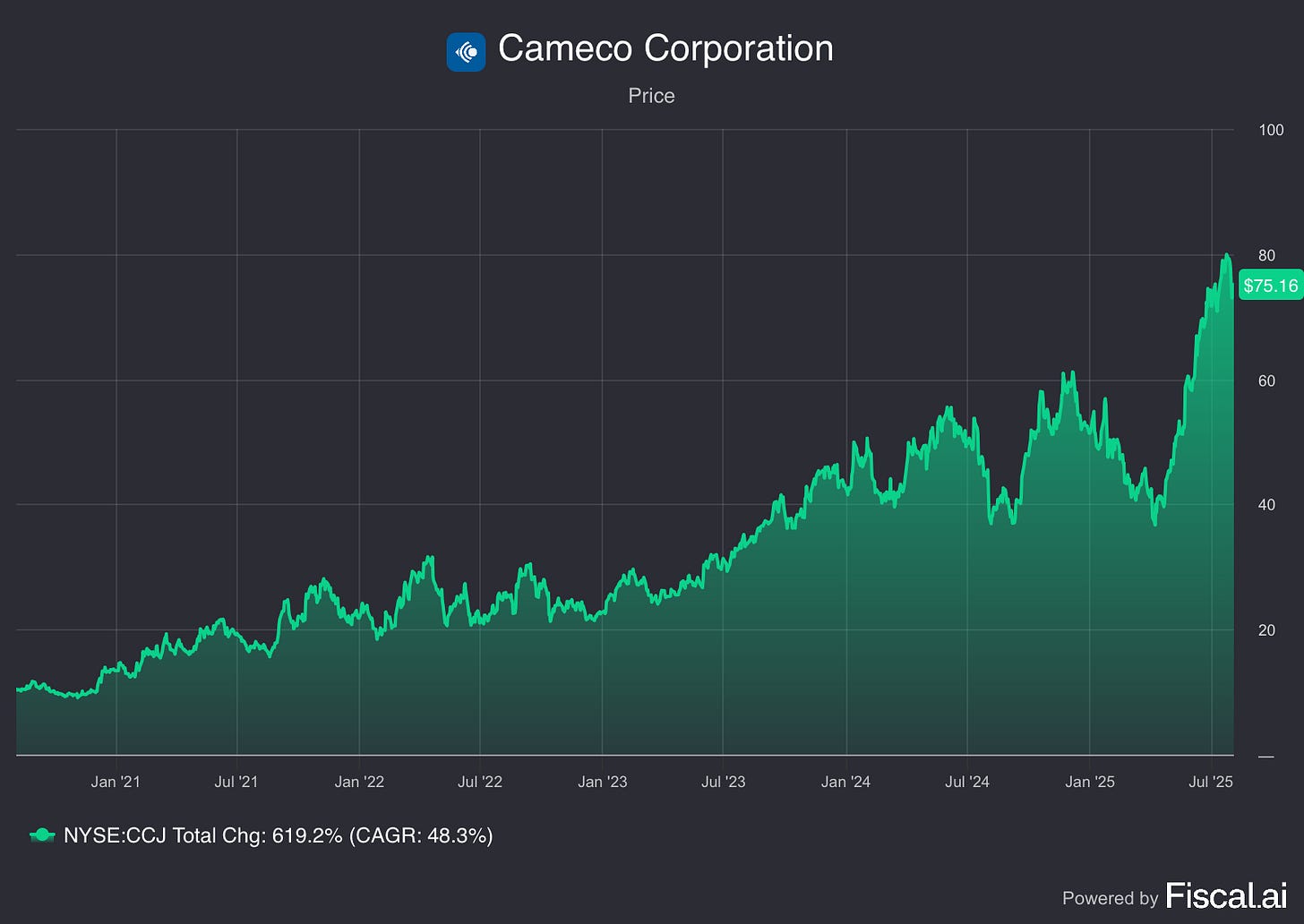This company is quietly powering the AI century
In an AI-powered world, energy is sovereignty - and uranium is a keystone.
Fellow travelers,
Wanted to share something I’ve been digging into that’s completely captured my attention over the past few weeks, simply as a builder trying to make sense of the tectonic shifts happening around us.
It started with a simple question: what powers the next decade? I mean it quite literally. What’s the energy source behind the chips, the factories, the data centers, the robots, the machines that think? The deeper I looked, the more one answer kept showing up: nuclear. More specifically: uranium. And there’s a company that I think is critical in this transition, yet quite unknown in the broader market - Cameco.
We talk a lot about AI models, compute, and chips, but very few people are talking about the real constraint: electricity. Stable, around-the-clock, low-emission baseload power that can run hyperscale infrastructure without collapsing the grid. Eric Schmidt is one of the people who’s alerting on this need:
Nuclear energy is a critical method that can do this at scale.
It’s not a popular opinion in some circles, but it’s quickly becoming an institutional one. The EU reclassified nuclear as “green” last year [2]. The U.S. DOE committed $1.5 billion to HALEU fuel for advanced reactors [4]. And the private markets are waking up: Sprott, Yellow Cake, and a few major ETFs are buying up physical uranium.
And here’s the kicker: 40% of global uranium supply comes from Kazakhstan and Russia [1]. In a post-Ukraine-war world, that’s a national security vulnerability for the West.
So who might Western utilities and governments trust in supplying this critical material?
Cameco.
Cameco isn’t just a uranium mining company. They own two of the highest-grade uranium mines in the world - McArthur River and Cigar Lake. But more importantly, they’ve built a Western-aligned, vertically integrated fuel chain. They convert and refine uranium. They hold long-term supply contracts with utilities. And they own 49% of Westinghouse, a leader building different types of reactors, among them SMRs (small modular reactors), which could become the equivalent of cloud computing for the energy grid.
Here’s a couple of data points that captured my attention about Cameco:
~28M pounds of uranium per year are already under contract through 2029 [6]
Cameco’s share of Westinghouse’s EBITDA expected to hit $525–580M in 2025 [6]
The stock might be considered overvalued when currently trading at ~20x EV/EBITDA, but the business has pricing power and structural scarcity.
Folks might think that it’s a commodity company but the real play is actually infrastructure. And the company has been doing pretty damn good in the past 5 years:
We're entering what I’d call the uranium awakening.
Electricity demand is about to explode. AI is a power hog, and the grid isn’t ready. Hyperscalers are already planning nuclear Power Purchase Agreements. Governments are accelerating SMR projects. And the only thing scarcer than chips might be the fuel needed to run the machines.
What I’m seeing in Cameco is a setup for a company that enables existential innovation, one that quietly underpins next-gen energy, in the same way TSMC underpins semiconductors or NVIDIA underpins AI.
This is part of a bigger shift that’s clearly coming - one where energy, industrial capacity, and national sovereignty become the real battlegrounds of innovation. And Cameco, strangely enough, is a company that sits right at that intersection.
Energy is a major constraint, and Cameco is a key player in enabling an energy abundance.
Thanks for reading,
Yon
Sources
IEA – World Energy Outlook 2023
World Nuclear Association – Performance Report 2024
McKinsey – Powering the AI Revolution
U.S. DOE – HALEU Fuel Program
Sprott – Uranium Outlook 2025
Cameco Q2 2025 – MD&A, Investor Relations, Earnings Call
Fiscal.ai - financial data
Disclaimer
This content is for informational and educational purposes only. It does not constitute investment advice, an offer, or a solicitation to buy or sell securities. Always do your own due diligence or consult a licensed financial advisor before making investment decisions.



